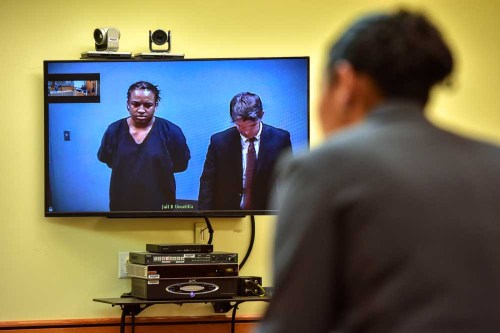BENT paid more than $27,000 to informant
Published 10:26 am Friday, April 26, 2019

- Defendant Antonio Reaves and his attorney Justin Morton listen to assistant disctrict attorney Jackie Jenkins during a sentencing hearing for Reaves on April 26, 2019, at the Stafford Hansell Government Center in Hermiston. Reaves was arrested in the BENT Operation Wildfire along with dozens of others with various drug charges.
The arrests of dozens of locals in January for drug crimes was the result of one confidential informant who received more than $27,000 for working with police.
The Blue Mountain Enforcement Narcotics Team’s Operation Wildfire relied on the informant from June until December 2018 to buy drugs throughout Umatilla, Morrow and Gilliam counties, according to court documents the Umatilla County District Attorney’s Office filed. He arranged the vast majority of the sales though Facebook Messenger. He wore a a microphone to record transactions during drug deals. The drug team searched him before and after each buy.
And BENT also paid him more than $27,000 as of February.
Stuart Roberts, Pendleton police chief and head of BENT’s board, said Wildfire’s informant came to BENT on his own, told police drugs affected his family and he was fed up with drugs poisoning his community. The informant also guaranteed he could deliver.
“He said he could buy from 63 different people,” Roberts said, “and he did.”
The district attorney’s office on Jan. 8 presented 58 Wildfire cases to the grand jury to decide charges. The informant was among the indicted. BENT on Jan. 16 rolled out with warrants and arrested 54 people at homes across the area, plus several who were in jails or prisons.
Roberts explained police work with three kinds of confidential informants. One is the “unwitting,” the person who gets in a jam with police and makes a deal to get out. The second is the “non-testifier,” the person who agrees to conduct a drug buy but will never testify in front of a jury. Roberts said these types are often “one and done.”
Then, he said, is the testifier, and they are rare. Wildfire’s informant is a testifier. He took the witness stand this week in the first jury trial of a Wildfire case. Antonio Reco Reaves, 35, of Burien, Washington, faces charges for selling heroin.
Court documents and the public trial identified the informant. But the East Oregonian is not identifying him in this story for two reasons: the EO was not able to contact the informant directly, and out of concern for his safety.
Defense attorney Kara Davis in early April filed a motion in 20 Wildfire cases, including the Reaves case, to compel the state to produce a full accounting of how much BENT paid the informant for services and what other actions it took on his behalf. Davis said this week the informant even received cash to testify to the grand jury.
The drug team’s budget runs about $150,000 a year. Roberts said most of that pay is overtime for the police on the task force and for drug buys. The $27,000-plus for the informant included $2,000 cash for information leading to a search warrant, according to court documents, and at least $2,600 for lodging. Roberts said BENT had to move the informant and his family to keep them safe.
He said the expense seems large, roughly a one-fifth of BENT’s budget, but the cost was not out of line with some past operations.
“The way we justify this is, if you can take that many dealers off the streets, you’re going to have an impact,” Roberts said. “Once we did Wildfire, things dried up. People couldn’t get their hand on anything.”
Roberts said BENT could have paid Wildfire’s informant $1,000 for a a couple of buys and moved on. But he questioned if the public would want that when the team had the resources and the informant willing to do much more.
Davis said she had evidence the informant used drugs, conducted drugs deals on the side and pressured women for sex in exchange for not ratting out their boyfriends, all while taking cash from BENT. Those actions would disqualify BENT from using the informant under its own policies, she said, yet no one investigated him.
Roberts said Davis nor anyone else reported those allegations. Until someone contacts the police and makes an accusation, there’s nothing to investigate.
He also said the drug team followed its policies. The informant on a few occasions showed up high, Roberts said, and the team scrapped the buy and sent the guy home. The police chief also said informants tend be be offenders and have connections to crime and are not going to be the most upstanding of citizens.
District Attorney Dan Primus said it is hard to know how paying an informant plays to a jury. Prosecutors present the evidence to bolster the state’s case, he said, but prosecutors and defenders don’t always get to know why a jury makes the decisions it does. Framing informant pay for a jury, he said, is “one of the things we have to evaluate with each case.”
Wildfire has plenty of cases still marching through the court. The jury this week found Reaves guilty of selling heroin, a Class A felony in Oregon.
Primus said several Wildfire defendants cut plea deals, but Reaves was the first jury trial. Reaves’ sentencing was Friday afternoon. The district attorney’s office recommended a prison sentence of 20 months, in part because Reaves has convictions in 2015 and 2016 for possessing drugs, attempting to elude, resisting arrest and more, and he committed the heroin crime a month after he finished serving probation.
Reaves received a sentence of three years probation. The Umatilla County Jail released Reaves Friday.





